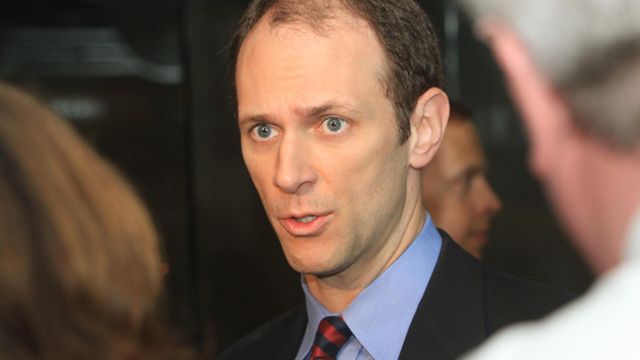Execs stress education, training to Jobs Council
Nearly 40 Triangle entrepreneurs and private sector executives shared their wants and wishes Monday with Obama's top economic advisor and other members of the President's Council on Jobs and Competitiveness.
Posted — UpdatedSo said a collection of nearly 40 private sector executives and entrepreneurs who met in Durham with Austan Goolsbee, chair of the Council of Economic Advisors to President Obama, and members of the President's Council on Jobs and Competitiveness
“We want to hear from you,” said Goolsbee, who chaired the meeting at a packed conference room in the headquarters of advertising and marketing firm McKinney.
After touring the American Underground new business incubator at the American Tobacco Historic District, Goolsbee and four other members of the Council huddled with the Triangle executives.
“You will never have a clearer line to the ear of the President,” added Goolsbee, who took numerous notes through the one-hour plus question-and-answer session. He pointed out that the Obama administration has already cut taxes and regulation and provided funding for additional loans from the Small Business Administration.
However, Goolsbee also acknowledged a recent report that fewer new companies were being started over the past five years than in 20 years of data. Citing other data that pointed out small businesses created a “net 40 million jobs” between 1994-2007 and have “always been a major driver of economic growth,” Goolsbee said the council was seeking ways to get the start-up job creation engine roaring again.
The audience responded with numerous suggestions, and the responses expanded far beyond the normal concern expressed by most Triangle startups – the lack of investment capital.
“It’s not just the capital,” said Christopher Gergen of Bull City Forward, an effort to help create more new ventures. “How do we get better deal flow?”
Deal flow is a venture capital term for start-ups in search of investors.
Laura Schoppe, whose company Fuentek works with federal agencies and labs in technology transfer, said government lab commercialization efforts are “not well funded.” One result, she stressed, is that the commercialization pipeline of government discoveries “is not full.”
Schoppe called for streamlining of commercialization and standardization of language so government labs and the private sector can be on the same page. She complained that the labs “don’t communicate” with each other.
Bill Brown of 8 Rivers Capital, an investment firm, noted that the government can be helpful through encouraging more people to become entrepreneurs. He also broadened the concept of what an entrepreneur is.
“A lot of people think they aren’t entrepreneurs because they aren’t creating something new,” he said. But his company is looking for startups who “focus on a problem” and to win its backing the company’s solution “must be cheaper and better.”
Katrina McCallum, a vice president with Red Hat, liked Brown’s comment about who is an entrepreneur.
“You have to be a problem solver – I love that,” she said.
In addition to helping foster more entrepreneurship, McCallum said the government could help the private sector by retraining workers for more technologically demanding positions.
“A lot of jobs are not easily retrainable,” said McCallum. “The technology gap is a very steep cliff to climb for a lot of people.”
Gergen also noted that companies are having trouble recruiting adequately trained employees, noting 5,000 open engineering jobs in the region.
Goolsbee pointed out that the government wants to “add 100,000 STEM teachers” for science, technology, engineering and math. But that number isn’t enough since many current baby boomer STEM teachers are nearing retirement, he noted.
The lack of qualified workers led to a discussion of immigration issues, which Goolsbee acknowledged is a politically sensitive topic.
Gergen recommended that any foreign student graduating with a PhD would receive an “automatic green card.” The debate about green cards that permit foreign workers, especially in high-tech, to work in the U.S. has supporters and critics on both sides of the political aisle.
In a series of proposals submitted to President Obama later Monday by the council, a relaxation of visas for foreign visitors was included. The council also said high-tech visas are a subject it will explore as part of a more formal job creation plan.
Steve Case, who heads the Startup America project for Obama and was part of the council touring the Triangle, said a good strategy going forward would be to “unbundle it from the broader debate.”
Other council members attending the discussion were Sheryl Sandberg, chief operating officer of Facebook, Dick Parsons, chairman of Citigroup, and Robert Wolf, chairman of UBS Americas.
Ping Fu, chief executive officer of Geomagic software and a member of the Startup America effort along with UNC-CH Chancellor Holden Thorp, also attended the meeting.
The jobs council includes subcommittees focused on jobs, high-growth companies, innovation, regulatory reform, infrastructure/investment, high tech education and taxes.
'It's really hard to get a company started'
Rion Holland, a WakeTech graduate, wanted to start a company designing video games, so he partnered with Joystick Labs, which is one of several businesses in American Underground. His idea then turned into a business reality with mentoring and other support.
"There's paperwork and there's business things that you don't take into account," Holland said.
John Austin, Joystick's managing director, says "it's really hard to get a company started."
"If you are working in your garage all alone, you haven't faced some of the problems of starting a company," Austin said.
Goolsbee saw Joystick's operation while on his tour Monday and liked what he saw.
"This is exactly the kind of environment where it's collaborative. There are a lot of people around. You know, they are bumping into each other all the time. That's where all the ideas spread," he said.
• Credits
Copyright 2024 by Capitol Broadcasting Company. All rights reserved. This material may not be published, broadcast, rewritten or redistributed.






